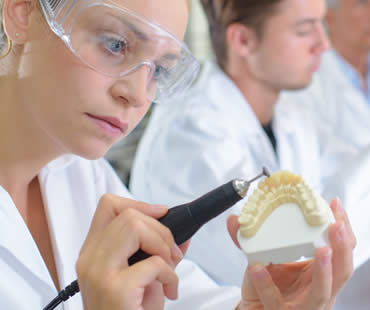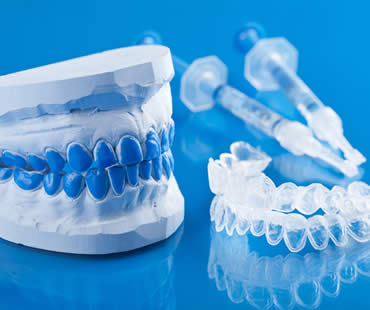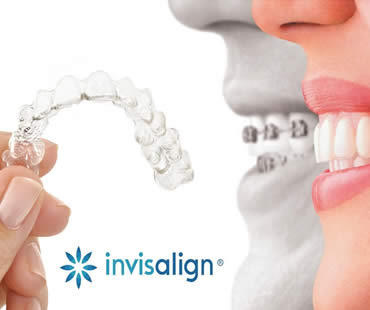
Dentures have been around a long time as a way to restore smiles plagued by missing teeth. They provide a solution for people who want to smile, talk, and eat as normally as possible. Unfortunately, removable dentures aren’t without issues. They can become loose or shift, making it uncomfortable to eat and talk. Messy denture adhesives are bothersome and ineffective for some patients. Therefore, advancements in dental technology have developed the option of permanent dentures.
What are permanent dentures?
Permanent, or fixed, dentures are suitable for patients missing one, two, or more teeth. The appliance is made up of a row of crowns or artificial teeth, which are connected together and the framework is supported by dental implants. The implants act like natural tooth roots, and the permanent dentures create a bite similar to natural teeth.
What are the benefits?
Fixed dentures definitely offers some advantages to removable ones. The need for messy adhesives is eliminated, and you don’t have to worry about loose or ill-fitting dentures affecting you. The force of your bite is also improved, so you can eat all kinds of foods without concern. Because a permanent upper denture doesn’t cover the roof of your mouth, your ability to taste and enjoy food is not sacrificed. This kind of denture stays in place for normal oral hygiene, so there are no special cleaning or soaking requirements. If properly maintained, permanent dentures can last for many years or even a lifetime.
Are there any disadvantages?
Permanent dentures are susceptible to oral problems like infection or inflammation because they are not removable. Also, it is possible that the crowns may require replacement in 10 to 15 years.
We treat patients from Fernandina Beach and the surrounding area

If you have just completed professional teeth whitening treatment, you probably want to protect your investment and extend the life of your shiny, bright smile. To enhance your healthy new smile and keep it white and bright, it’s important to follow a few simple guidelines:
- Do follow good oral hygiene practices by brushing and flossing regularly after every meal.
- Don’t drink colored beverages such as red wine, coffee, cola or tea immediately after treatment, and continue to avoid them whenever possible to prevent staining.
- Do drink beverages with a straw when you must drink dark-colored beverages to prevent the liquid from touching your teeth and causing stains.
- Don’t eat pigment-intense foods for several weeks after whitening. Berries, dark chocolate, soy sauce and other foods with a dark color can leave residue that leads to staining.
- Do use a gentle tooth whitening mouthwash after eating to rinse away food and debris that could cause staining and to keep your breath fresh.
- Don’t wear lipstick or colored gloss for at least one week after whitening treatment, as your teeth are still sensitive immediately after treatment and lipstick can leave pigments that will stain your teeth.
- Do use a whitening toothpaste to increase the results and aid in the longevity of your treatment.
- Don’t forget to eat a healthy diet and drink water to keep your teeth strong and vibrant.
A whiter smile can brighten your face and take years off your looks. By following these easy recommendations, you can extend the life of your whitening treatment and enjoy the benefits of your bright, new smile.
Our dental office is located in Fernandina Beach

Life is full of special events that you will remember forever. When you look back at photographs from your special days, you will want to know that you looked your very best. Weddings, birthdays, reunions, graduations, anniversaries, job interviews, or that very special first date are times you will want to put your best face forward. Everything begins with your smile. Your dentist can help you prepare for these kinds of events by brightening your smile, making you look younger and more vibrant and boosting your self-confidence.
Your teeth naturally discolor with age, and this process is accelerated as you eat various foods and dark beverages. Blueberries, blackberries, and beets can all leave stains on your teeth. Dark sodas, coffee, tea, and red wine can also leave their mark with residual color on your teeth. Don’t find yourself feeling self-conscious about your discolored smile; talk to your dentist about what teeth whitening options are available to you. Not all whitening processes are good for every type of teeth. Your dentist will know what is ideal for you.
Before you whiten, it is important to have a dental exam and cleaning. The results of your whitening depend on the initial condition of your teeth. Cleaning your teeth ensures that the whitening procedure affects all of the areas of your teeth, and doesn’t leave out areas currently hidden by plaque or tartar.
Because some teeth whitening techniques require time to achieve the best results, you need to plan ahead. Begin with a consultation with your dentist several weeks prior to your special day, to allow time for the whitening process to work. Some people experience increased sensitivity to their teeth after whitening. Starting early will allow your teeth to recover from the whitening process.
A brighter smile will always help you look and feel better. It will help you make the most positive first impression. On your special day, when you smile for the camera, your confidence will show. You’ll love what you see in photos for years to come.
If you need a dentist in Fernandina Beach contact us today

One of the most important decision for the health of you and your family is a family dentist. Similar to a general dentist, family dentists offer a few significant exceptions. Both types of dentists treat oral health and manage dental hygiene, but family dentists offer care to patients of all ages. This makes family dentistry a convenient choice especially if you have family members of various ages in your home.
Traditional dental services that you’d expect from any dentist are available at a family dental office. Preventative services like professional cleanings, fluoride treatments, and thorough examinations are offered. Regular checkups allow for diagnostic tests to catch problems in their early stages, before they have a chance to advance and become very painful or complicated to repair. Procedures like dental fillings, bonding, root canal therapy, teeth whitening and more are often available through your family dentist. If specialized care is required that is not performed in the office, the dentist will provide a referral to an appropriate specialist for treatment.
Finding the right family dental practice for your whole family is vital. This will increase the comfort level of your family members and promote checkups every six months as advised by dentists. To choose your family dentist, ask friends, family, coworkers and neighbors for recommendations. Schedule a consultation to meet the dentist and staff, see the office, and make sure the practice meets your requirements. It is especially important to ensure children are comfortable with the family dentist to help avoid fears or anxiety. Also look for an office convenient to your home so that everyone will be more likely to keep their appointments.
From baby teeth in kids to permanent teeth in adults to missing teeth in seniors, family dentists are trained and equipped to handle everyone’s needs.
Schedule your appointment at our Fernandina Beach dental office

Straighter teeth are possible through traditional metal braces or Invisalign clear aligners, but how do you know which are right for you? These two types of orthodontics work differently to improve smiles. Invisalign uses invisible removable plastic aligners to gradually shift teeth, while metal braces require brackets bonded to the teeth and arch wires to apply pressure to move the teeth.
If you are deciding between these two types of treatment, ask yourself some questions to help you choose:
- How severe is your case? Moderate conditions like overcrowding, gaps, and overbite or underbite issues can be treated with either option. However, more severe cases like malocclusions, jaw problems, crossbites, or seriously crooked teeth may require metal braces for more effective results.
- Do you care if others see your braces? Metal braces are very noticeable and bulky, while Invisalign is virtually invisible in your smile. Adults and self-conscious teens may prefer the concept of hidden orthodontic treatment.
- Will you be diligent in wearing aligners? They should be worn at least 22 hours each day for best results, so neglecting to wear them consistently can negatively impact your smile or require longer treatment time.
- Are you concerned about keeping your teeth clean? Metal braces can be difficult to clean because food becomes caught in the wires and brushing may not easily reach all areas. Since Invisalign trays are removable, brushing and flossing are performed normally throughout the process.
- Are you worried about teeth stains? Since it’s easier to keep teeth clean with Invisalign, you avoid the risks of stains from food and plaque buildup around metal braces that may stain your teeth.
- How often do you want to visit the orthodontist? Metal braces require office visits at least every 4 weeks for tightenings. Invisalign trays are changed every 2 weeks, but many orthodontists provide a series of trays to take home so that an office visit isn’t required each time. It’s possible that you may not visit the orthodontist as often with Invisalign.
The ideal choice for your orthodontic treatment can be decided by consulting with your orthodontist. Find out which option will best transform your smile.
If you live in the Fernandina Beach area contact us today

Dental implants can last a lifetime with proper care. Like natural teeth, dental implants require vigilant oral care to maintain their usefulness and prevent problems. Once the implant has fused to the jaw bone, it is important to follow some general guidelines to ensure the continued success of your dental implant and restoration.
A condition known as peri-implantitis is a common cause of implant failure. This occurs when an accumulation of plaque leads to damage of the tissues and infection of the bone around the implant. While the implant itself is not susceptible to decay, if plaque is not removed with thorough brushing and flossing at least twice per day the resulting periodontal disease can lead to implant failure.
Your dental professional may also recommend the use of additional oral hygiene products such as special brushes or oral irrigation devices to aid in the removal of food debris and plaque around the areas of the implant supported restorations. Your dentist or hygienist can assist in teaching you to utilize these devices to improve your implant care.
Regular dental visits and examinations are vital to detect and prevent any issues that may present problems for your dental implants. Expect to visit your dentist every 3 months for the first year after implant placement, and then every six months for the life of your implants. Your dentist will also provide special care instructions if your implants are being used to support a removable denture. It is important to know how to place and remove the appliance without causing damage to either the denture or your implant.
Avoid applying excessive pressure or eating hard foods that could cause damage to the restoration and implant area. If you suffer from conditions like teeth grinding or clenching, discuss with your dentist the option of being fitted for a night guard to prevent the problems these habits can cause your implants. Taking excellent care of your oral health will help to ensure years of dental implant success.
Schedule your appointment at our Fernandina Beach dental office







